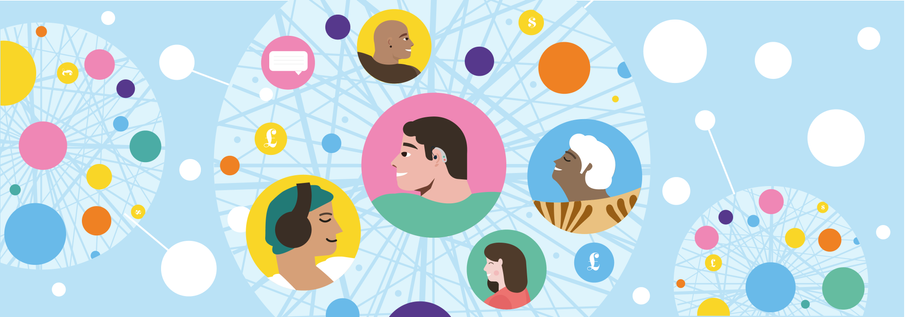How do our social connections enrich our lives?
There are countless viral quotes that say something along the lines of, if you’re rich in friendship you’re rich for life – the point being that our connections enhance our lives in ways other factors can only just scratch the surface. But behind the greeting-card-ready soppiness, is the foundation of a very real sociological concept.
A precise definition of ‘social capital’ isn’t always easy to pin down, as its application is varied and debated, but it generally refers to the way in which our social relationships have productive benefits – in our careers, for our health, our mental wellbeing, and pretty much all aspects of our lives. ‘Capital’ is an asset that we can trade in, like money, and so social capital essentially captures the way in which our friendships and connections unlock these benefits – in short, rich in friendship, rich in life.
Of course, that can be in financial terms (think, for example, it’s not what you know but who you know), but perhaps more interesting is the way in which being rich in social capital can enhance our health and wellbeing.
“As social creatures, our nervous systems are hardwired for social connection,” explains psychotherapist Ruth Parchment. “Our ‘happy hormones’ increase with good friendships, these include dopamine, oxytocin, serotonin, and endorphins that can help reduce stress and feelings of pain.”
Ruth points to two fascinating studies. The first, published in the Journal of Women & Aging, found that cortisol levels (a stress hormone) were significantly lowered when participants spoke to their friends, and that friends played a significant role in helping one another solve difficult life problems. The second, conducted by Oxford University, found that people with a wide social circle experience a higher pain tolerance threshold compared to those people with fewer friends.
So what does social capital look like in practice? Well, say you’re heading to a job interview, and you get a call from a friend to wish you luck and to give you a last-minute reminder of how incredible you are, that’s going to give your self-esteem a boost, right? Now let’s say that you’re going through a rough patch with your health, and a friend notices, you then get the help you need with the support of a loved one, and you start down the path to recovery. Or maybe you’re drowning in errands in the lead-up to a big event, but you can call on a friend who you know will take a couple of things off your to-do list so you can put your energy elsewhere. Each of these are examples of the everyday ways that connections make our lives easier, meaning we have the time, energy, resources, and confidence to succeed.

How to boost your connections
Psychotherapist Ruth Parchment’s tips for raising your social capital:
Be open to new connections and possibilities for friendships
Each person we meet provides the opportunity for connection with another human being. Being open allows us to be present, to find commonality, listen, and share; qualities that help build and maintain friendships and connections.
Improve your self-confidence
One of the biggest obstacles to social connection is social anxiety and low social confidence, there’s fear of being judged negatively, rejected, humiliated, and coming across badly. A useful tip for addressing social anxiety is to focus your attention outwards, so that you are really paying attention to the other person and situation, as opposed to being caught up in your internal fears and worries. Cognitive behavioural therapy (CBT) has a great evidence base in helping people learn practical ways of addressing social anxiety.
Consider what you value in a friend
Is it someone that you can enjoy activities together with? Someone you can have deep conversations with? Someone who understands or shares aspects of your identity? There may be a mixture of values that feel important in a friendship, I encourage you to think of what yours might be.
Positive friendships and connections are important
I use the words, “positive friendships and connections” because we can experience social connections that make us feel bad and deplete us. It’s important to gravitate towards friendships and connections that generally feel positive. Qualities such as trust, consistency, good communication, and shared values, are helpful to consider.
“Friendships can also help boost fun, a sense of adventure, creativity, and playfulness,” Ruth adds. “There is growing research on how playfulness in adults can improve happiness and decrease stress and anxiety. I’m eternally grateful to a friend who encouraged me to try out a sculpture class many years ago. Creating things has become one of my favourite pastimes, providing a space in which I can connect with my playful creativity.”
All this said, it’s important to remember that friendship isn’t a means to an end, and we shouldn’t think of the people in our lives in terms of their transactional value, ready to cash them in at any point. Instead, the concept of social capital encourages us to take note of the ways that the connections we have support us in all areas of our lives, how being ‘rich’ in deep, fulfilling, honest relationships broadens our horizons – and it should be a ‘give and take’ dynamic. It helps us to understand how all these factors intermingle, and how they help us to get ahead. So, it might be time to take stock of your social capital and trace the ways your friendships support you – you may be surprised at how deeply they run.
Ruth Parchment is a psychotherapist who specialises in cognitive behavioural therapy. She helps people connect with their values and authenticity. Find out more by visiting counselling-directory.org.uk


Comments